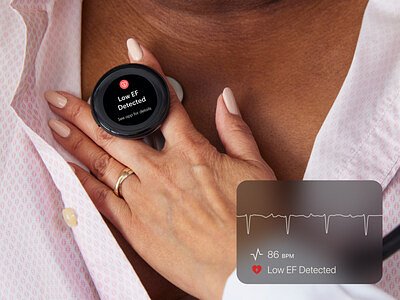
AI-Powered Stethoscope Brings Heart Failure Diagnosis to Remote African Clinics
A new AI-powered stethoscope is revolutionizing heart failure diagnosis in underserved African communities, bringing specialist-level care to primary healthcare settings and reducing reliance on costly imaging.
AI-Powered Stethoscope Brings Heart Failure Diagnosis to Remote African Clinics
Kumasi, Ghana – In a significant step towards equitable healthcare access, a novel AI-powered stethoscope is proving its potential to diagnose heart failure in remote African communities, offering a cost-effective and accessible solution to a growing health challenge. The technology, developed by Eko Health, was recently validated in a large-scale clinical trial in Ghana, demonstrating its ability to accurately identify patients at risk of heart failure even in settings with limited access to specialist cardiology services.
Heart failure is a leading cause of morbidity and mortality worldwide, but diagnosis can be challenging, particularly in resource-constrained settings. Traditional diagnostic methods, such as echocardiograms, require expensive equipment, trained technicians, and often, travel to specialized centers – barriers that severely limit access for millions in Africa.
The Eko SENSORA, a digital stethoscope integrated with artificial intelligence, aims to bridge this gap. The device captures heart sounds and, using a proprietary algorithm, analyzes them to detect patterns indicative of a low left ventricular ejection fraction (LVEF) – a key indicator of heart failure. The AI’s accuracy was confirmed in a rigorous clinical trial conducted in Ghana, and the device received FDA clearance in the US in 2023.
Bridging the Diagnostic Gap with AI
The Ghanaian study, conducted in partnership with the Komfo Anokye Teaching Hospital (KATH), utilized a ‘hub-and-spoke’ model. Healthcare workers at primary health clinics (the ‘spokes’) used the Eko SENSORA to screen patients. Suspect cases were flagged and digital recordings transmitted to cardiologists at KATH (the ‘hub’) for rapid review. This system dramatically reduced the time to diagnosis and referral, enabling earlier intervention and potentially improving patient outcomes.
“One of the biggest challenges in providing care in remote areas is the lack of specialist expertise,” explains a healthcare worker involved in the trial, speaking anonymously. “This device allows us to identify patients who need further evaluation, even if we don’t have a cardiologist on site. The rapid turnaround from the hub is crucial.”
The trial demonstrated that the AI-powered stethoscope achieved a high degree of accuracy in identifying patients with low LVEF, comparable to traditional diagnostic methods. “The results were very promising,” says a cardiologist at KATH involved in the study. “The device is not intended to replace echocardiography, but it can serve as an excellent triage tool, helping us prioritize patients who need further investigation.”
The ‘Hub-and-Spoke’ Model: A Scalable Solution
The success of the trial hinges on the effective implementation of the ‘hub-and-spoke’ model, a healthcare delivery system increasingly recognized for its potential in resource-constrained settings. By extending specialized care to remote areas through a network of primary health clinics, the model can improve access, reduce costs, and enhance health outcomes.
“The hub-and-spoke model is particularly well-suited to the African context,” explains a public health expert familiar with the project. “Many countries already have some form of this system in place, so integrating a new technology like the Eko SENSORA is relatively straightforward.”
However, challenges remain. Ensuring consistent digital connectivity, providing adequate training for healthcare workers, and securing sustainable funding for device procurement and maintenance are crucial for long-term success.
Beyond Ghana: Expanding Access to Cardiac Care
The potential impact of this technology extends far beyond Ghana. Several other African countries are exploring the feasibility of implementing similar programs, and Eko Health is actively seeking partnerships to expand access to cardiac care across the continent.
While the Eko SENSORA is not a silver bullet, it represents a significant step forward in addressing the diagnostic gap in cardiac care. By leveraging the power of AI and innovative healthcare delivery models, it offers a practical and affordable solution for bringing specialist-level care to underserved communities.
“We’ve seen the potential of this technology to transform the way we deliver care,” says a healthcare administrator involved in the trial. “It’s not just about diagnosing heart failure; it’s about empowering healthcare workers and improving the lives of patients.”
Competition and Future Innovations
While Eko Health currently stands out with its validated and implemented device, the field of AI-driven cardiac diagnostics is rapidly evolving. Other companies and research institutions are developing AI algorithms for ECG interpretation, echocardiography analysis, and remote patient monitoring. Smartphone-based diagnostics, although still in early stages, also hold promise for future innovations. However, Eko’s focus on a user-friendly, portable device integrated into existing clinical workflows gives it a distinct advantage.
Looking ahead, the integration of AI with telemedicine platforms and the development of personalized risk assessment tools could further enhance the impact of this technology, paving the way for a future where high-quality cardiac care is accessible to all, regardless of their location or socioeconomic status. The combination of lower-cost devices like the Eko SENSORA and innovative delivery models like the hub-and-spoke system is a powerful combination for addressing global health inequities.
